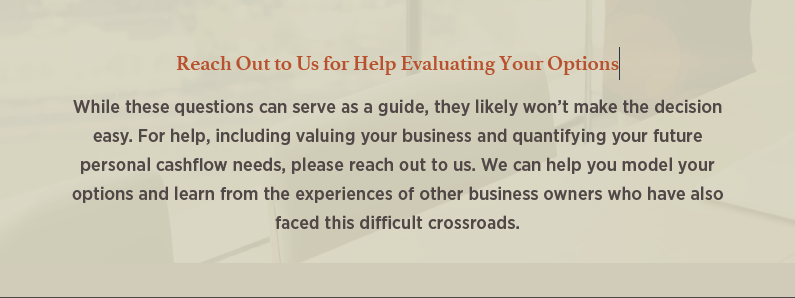As a business owner, you will likely face a difficult decision: whether to keep or sell your company. This may happen over time as you set your sights on retirement. Or it may happen more suddenly, for example, when confronted with an unsolicited offer, favorable market conditions or the need for capital.
Regardless of the trigger, having a plan ahead of time can help you maximize the value of your business, whether through a sale or as a continued source of income for you and your family.
But easier said than done. We know from serving other business owners that this decision often involves answering complex questions and dealing with strong emotions.
To make it easier for you, here are some questions to consider and discuss with your family and advisors.
Is your business a financial asset, or more, to you and your family?
Most business owners care deeply about their company and employees. But for some, the value of their business runs even deeper than taking care of their company’s stakeholders financially. It is part of their family’s history and identity, something they would like to pass down to their children or other beneficiaries. If that is the case, you should adopt strategies for being able to keep your business in the family. If not, you will want to adopt a different set of strategies for readying your company for a sale.
Is someone willing and able to inherit your business?
If you determine that you would rather pass your business down to your children or other beneficiaries, you should carefully consider whether suitable successors exist. Is the next generation interested in running your business? Have you talked to them overtly about this possibility? Are they capable? Do you believe they will have the right motivations and skills to continue your hard work and vision? This is often one of the most difficult pieces of succession planning for business owners to address. But not proactively doing so can create much more difficult situations — such as family conflict and declining business value, down the road.
Can you afford to sell (or keep) your business?
Answering this question can be broken down into a three-part exercise:
- PART ONE | Valuing your business
Among privately held companies, 98% haven’t been valued(i). But this number is arguably the most important input needed to determine if you should sell your business, not to mention knowing if it is properly insured and funded.
If, like many business owners, what’s stopping you is a lack of time and/or concerns about the expense, know that you have options. While a certified business valuation, one that adheres to the Uniform Standards for Professional Appraisal Practice (USPAP) guidelines,is needed in certain situations, simpler options exist. For example, our firm partners with BizEquity, a patented, online service that makes business valuation easier and more affordable. - PART TWO | Quantifying your personal goals
The other necessary side of the equation is, of course, how much money do you need? What are your plans for retirement? What large purchases (e.g., a second home) do you plan to make? How much money would you like to leave to family or charity? Identifying and quantifying the cash outlays associated with these goals will then allow you to reconcile them with the cash inflows (net of taxes) associated with keeping or selling your company. The numbers may surprise you, possibly making the decision much easier. - PART THREE | Understanding what it would take to sell your business
It is also possible that, through the first two parts of this exercise, you determine that you would need to invest significant time, money and effort into increasing the value of your company in order to sell it. If that is the case, you need to ask yourself: Am I willing to put in the effort to make my business more attractive to potential buyers? This often includes initiatives such as further developing your leadership team, investing in operating systems and diversifying your customer base. Confronting this reality helps some business owners decide their company is more of a lifestyle business than a growth-oriented business, worth sustaining for as long as possible for the income rather than preparing for a future sale with the hopes of a financial windfall.
GROWTH-ORIENTED BUSINESS
Experts describe a growth-oriented business as capable of renewing itself through changing generations of technology, employees, and customers. In other words, the business can survive and prosper after the founder is no longer a part of it. This doesn’t mean that you cannot sell your business if you haven’t accomplished that status, but any buyer will most likely consider where you are on that path and what needs to be done for your business to be self-sustainable.
LIFESTYLE BUSINESS
A lifestyle business is a business set up and run by its founders primarily with the goal of sustaining or supporting the income and personal requirements of the owners. To some extent, it is still profit-oriented, but revenue maximization is not at the top of its list of priorities. Typically, the goal of many lifestyle businesses is not to sell because, without the founders involved, the business may not be
the same.
(i) Early, Jason and Medico, Bill. “Jason Early and Bill Medico on Serving Small Business Owners,” BizEquity, https://blog.bizequity.com/jason-early-and-bill-medico-on-serving-small-business-owners. Accessed April 22, 2022.





